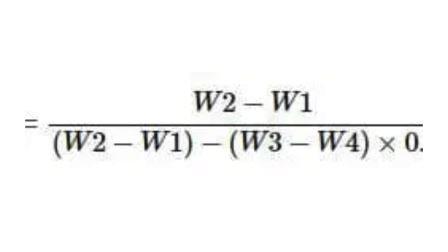Specific Gravity Of Cement – The ratio between the mass of a specified volume of substance and the weight of an equivalent volume of water is used to calculate specific gravity. Kerosene, which does not react with cement, is used to determine the specific gravity of cement. In this post we will know about cement specific gravity.
What is Specific Gravity?
Specific Gravity is the ratio of a Weight of Volume of material (Your testing material) to the same Weight of Volume of water.
In simple words, The weight of a given volume of material divided by the weight of an equal volume of water is known as the specific gravity. The specific gravity of portland cement is approximately 3.15.
According to the Portland Cement Association (PCA) of 1988, the value of Portland pozzolan cements and Portland blast furnace cements will be close to 2.90. Kerosene, which does not react with cement, is used to determine its specific gravity.

Significance of Specific Gravity of Cement
The specific gravity of cement can increase or decrease depending on the amount of moisture present. The cement particles have pores or particles within them that can hold water.
A nominal mix is made with a 3.15 specific gravity cement. Any change in the specific gravity value will have an impact on the mix design.
As a result, before beginning the mixing process, the specific gravity of the cement must be determined. This is the primary reason for not using old stock cement. External moisture content may affect old stock cement.
Specific Gravity Test on Cement
Determination of Specific Gravity of Cement : Test, Features and Importance | Equipment and Apparatus for Specific Gravity Test On Cement
Most people are aware that cement has a specific gravity of 3.1-3.16 g/cc. Do you understand the purpose behind and significance of the cement’s specific gravity calculation? I’ll dispel all of your questions about cement’s specific gravity in this post.
Le Chatelier’s Flask method is used to calculate cement’s specific gravity in accordance with the Le Chatelier Principle. And IS 2720-Part 3 is the IS code for the Specific Gravity Test.
Apparatus Required for Le Chatelier’s Principle:-
- Le Chaterlier’s flask
- Kerosene (free from water).
- Weighing Balance
- Specific Gravity Bottle capacity of 250 ml with stopper.
Le Chaterlier’s flask is made of thin glass with a bottom bulb. The bulb has a capacity of almost 250 millilitres. The average diameter of the bulb is 7.8 cm. In millimetres, the stem is graduated.
At a distance of 8.8 cm from the bulb’s top, the zero graduation can be found. A bulb with a length of 3.5cm and a capacity of 17 ml can be found 2 cm from the zero.
The stem is marked with 18 ml at 1 cm from the bulb and grated to a maximum of 24 ml. Above the 24ml mark, the portion is in the shape of a 5cm diameter funnel.
The specific gravity of Kerosene is 0.79 g/cc
The specific gravity of water is 1g/cc
Procedure for Specific Gravity Test on Cement
- Step #1 : The flask must be completely dry and free of liquid and moisture before being used. W1 represents the weight of the empty flask.
- Step #2 : The bottle is half-filled with cement (approximately 50gm) and sealed with a stopper. W2 is assigned to the arrangement, which is weighed with a stopper.
- Step #3 : The top of the bottle is filled with kerosene. Air bubbles are removed from the mixture after it has been thoroughly mixed. W3 is the weight of the flask containing kerosene, cement, and a stopper.
- Step #4 : The flask is then emptied and filled to the brim with kerosene. W4 is assigned to the arrangement after it has been weighed.
Observations and Calculations
Specific Gravity of Cement Sg is given by the formula (Specific Gravity of Cement Formula) ,

Here, the specific gravity of kerosene is 0.79g/cc . Note:
- Duplicate determination of specific gravity should agree within 0.01.
- To get an accurate result, the flask should be held in a constant temperature before each reading is taken.
The specific gravity of water is 1g/cc.
Cement Specific Gravity Result – A good cement should have the Specific gravity of 3.1-3.6 g/cc.